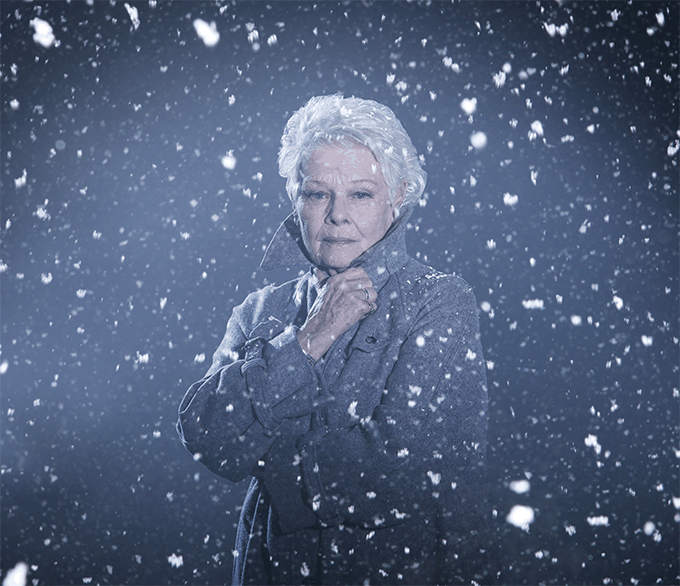As Kenneth Branagh’s yearlong season in the West End’s Garrick Theatre continues, we review his seasonal programme, including The Winter’s Tale starring Judi Dench.

With a smattering of British icons, a generous dollop of young talent and a fine sprinkling of snow, Kenneth Branagh has cooked up the perfect seasonal recipe for the West End this winter.
The newly refurbished Garrick Theatre, which takes its name from the legendary 18th-century actor-manager David Garrick, is a fitting home for Branagh, whose yearlong season at the theatre continues with The Winter’s Tale and a double bill of Terence Rattigan’s Harlequinade/All On Her Own, which run together in repertory until 16 January.
It’s a very British feast with the lavish performance of The Winter’s Tale, starring Branagh himself as Leontes, the king of Sicilia, who is seized by a sudden conviction that his pregnant wife, Hermione, has been having an affair with his childhood friend Polixenes, and Dame Judi Dench as Paulina, the ‘audacious lady’ who dares stand up to the jealous king.
Opening with a Christmas tree on stage and a child requesting a seasonal story, the new production, co-directed by Rob Ashford and Kenneth Branagh, with atmospheric music by Patrick Doyle, has a wonderfully festive feel with handfuls of ‘snow’ adorning the heads and shoulders of the audience well into the interval.

Initially, however, the atmosphere on stage is icy. With similar themes to Othello, The Winter’s Tale picks up pace quickly. One of Shakespeare’s later plays, the work is classed as a tragicomedy or a romance. When it was first performed at the Globe in 1611, Shakespeare’s audience would have understood, in a way that perhaps modern audiences might not, that a winter’s tale, like an old wives’ tale, refers to a folk story that is not necessarily true, and there is certainly a magical fairytale element to the latter half of the play.
Christopher Oram’s set, which creates the sense of a theatre within a theatre on stage, conveys the idea of a story within a story, with the rich reds of Sicilia at the opening giving way to cold blues after tragedy has struck. Neil Austin’s lighting enhances the chilly atmosphere and, later, the sense of magic – with Jon Driscoll’s projections providing a very modern solution to one of the most famous of Shakespeare’s stage directions: Exit, pursued by a bear (which might have been fulfilled by a real bear in Shakespeare’s time; the Globe Theatre was not far from London’s bear-baiting pits). The pastoral dancing, choreographed by Rob Ashford, and earthy humour of the second half are a welcome delight after the darkness of the first.
From the moment Branagh utters the words “my heart dances; But not for joy”, as he watches Hermione with Polixenes, one’s heart sinks. The actor who hasn’t appeared in the West End since 2008 is on fine form – his conflict when Paulina presents him with his infant daughter is particularly terrible and moving. Judi Dench is magnificent as the brave Paulina and Miranda Raison luminous as the wronged Hermione. Yet, in truth, it is an ensemble performance with esteemed British actors Michael Pennington, John Shrapnel and Jimmy Yuill joined by fine younger performers such as Hadley Fraser, Jessie Buckley and Tom Bateman.

It is fun spotting many of the cast appear again in Rattigan’s rarely seen comic gem Harlequinade, ‘the lightest soufflé’ about a classical theatre company attempting to produce Romeo and Juliet and The Winter’s Tale. With Branagh playing actor-manager Arthur Gosport, who is said to be based on John Gielgud, in addition to co-directing the production again with Rob Ashford, Harlequinade is a most apt partner in repertory for The Winter’s Tale – not only for the ongoing auditions for the latter that take place in the former – but for the abundance of theatrical in-jokes that give the sense that Branagh and his company are enjoying poking a little fun at themselves after the weightiness of The Winter’s Tale.
In addition to playing Dame Maud in Harlequinade, Zoë Wanamaker performs Rattigan’s dramatic monologue All On Her Own, which has never before played in the West End. Twenty years separated the creation of the two works and the playwright – whose characters are known for their British restraint and manners – is said to have regarded All On Her Own’s ‘impeccably polite’ Rosemary as something of a self-portrait. This brief but powerful play is to be staged every evening before Harlequinade, which makes a perfect dessert to a fine winter feast.
To buy tickets and for more information, see www.branaghtheatre.com Although many performances of The Winter’s Tale have now sold out, it will be broadcast live on 26 November to more than 1,300 cinemas worldwide, for further information visit www.branaghtheatrelive.com
Download BRITAIN Magazine to your mobile today

 No mobile device? Purchase directly on Zinio for your desktop!
No mobile device? Purchase directly on Zinio for your desktop!






 © 2024
© 2024